- Home
- Best quality dog food
- Cocker Spaniel diet
Cocker Spaniel Diet: What's The Best Nutrition For My Dog?
The ideal Cocker Spaniel diet should consist of a healthy balance of nutritional foods to make sure your pet gets all the nourishment his little body needs. A healthy diet will not only help to keep your best friend trim, it can help him to live a longer, healthier and happier life too!
The Ideal Cocker Spaniel Diet
Ideally, your Cocker Spaniel's diet should include protein, carbohydrates, fats, fibre, vitamins and minerals to ensure your dog eats a wide variety of nutritious food to help keep him fit and healthy.
Cocker Spaniels are prone to putting on the pounds, so it's essential to understand his diet and watch those calories!
Proteins in Your Cocker Spaniel's Diet
Protein will help your dog build strong bones, toned muscles, a shining coat and problem-free skin; it will keep his overall health in tip-top condition!
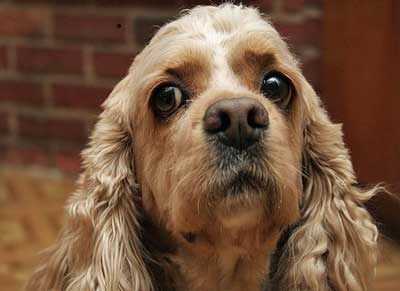 What's for dinner Mum?
What's for dinner Mum?Animal protein can be found in good quality meat and fish and should be included in the Cocker Spaniel diet: salmon, turkey, chicken (without the skin or bones), beef, or lamb.
Don't forget to trim off any excess fat.
Protein can also be found in eggs, vegetables and cereals.
The Cocker Spaniel Diet: Fats
Fats are an essential part of your Cocker Spaniel's diet.
They help protect his internal organs and maintain healthy skin, shining coats, and clear eyes.
Fats also help to keep his bones and joints strong and supple and can offer some protection against arthritis.
You undoubtedly already know that Cockers are prone to obesity, making the need to carefully manage our pet's intake of fats a priority.
Too much fat in Fido's diet is not suitable for his arteries, and it can raise cholesterol levels too. It will almost certainly make him overweight!
Essential oils and fats can be found in meat (chicken/lamb/beef - animal fats) fish, (cod-liver oil) and vegetables (olive oil, sunflower oil).
Carbohydrates & Fiber in Your Cocker Spaniel's Diet
A healthy Cocker Spaniel diet should also contain enough carbohydrates to give your dog the boundless energy he needs to stay active all day long.
Good carbohydrates, which slowly release energy throughout the day, can be found in many fruits and vegetables and grains such as rice, barley or oatmeal.
Carbohydrates such as rice and wheat can also provide your dog with the fibre he needs to help with digestion and can help to keep his bowels regular.
Vegetables provide fibre too, but it's best to stay away from those that produce lots of gas. Instead, stick to beetroot or pumpkin. A couple of tablespoons should be enough but don't overdo it, or you may regret it!
Vitamins & Minerals
Essential vitamins and minerals are also necessary for your Cocker Spaniel's health, and some manufacturers include additional vitamins and supplements in their dog food.
If your pet's diet is completely balanced, you won't need to supplement his diet at all.
Please be aware that too many vitamins and minerals can cause your pet harm, so play it safe and take expert advice from your vet first.
Water: An Essential Part of the Cocker Spaniel Diet
Water is just as essential to your dog's diet as all of the above.
You must ensure his water bowl is filled with fresh water every day, and if the weather is hot, you may need to refill his bowl a few times each day.
If your dog doesn't drink enough water, it can cause problems with his digestive system, such as constipation.
A lack of water can also cause him to dehydrate, which is not good news.
Recently, Max has started to drink much more water, so I will be taking him to see the vet soon as I believe he may have diabetes.
Benefits Of A Healthy Cocker Spaniel Diet
There are many health benefits to be gained from a nutritious, well-balanced Cocker Spaniel diet, such as:
- boosting and protecting your Cocker's immunity,
- protecting him against illness and disease,
- helping to reduce food allergies,
- building strong bones and good muscle tone,
- aiding good digestion and elimination,
- ensuring your Cocker's skin is healthy, and his coat is gleaming.
A healthy, nutritious diet can improve your pet's immune system, strengthen his bones, and develop well-toned muscles; a nutritious diet will improve his overall health.
And whilst you might pay a little more for a better quality diet for your Cocker Spaniel, his improved health is well worth it, but there is an additional payback.
You'll probably need to visit the vet much less often (more money in your pocket!) because your pet's immune system will be robust, and his general health will be much better.
A Healthy Cocker Spaniel Diet Will Keep Him Trim
A healthy diet can also help to keep your pet's weight stable.
Like most dogs, Spaniels are always ready to eat (no matter what time of day it is!), making them prone to obesity.
They're also at risk of getting a little chubby as they grow older and become more sedate, but if your pet's food is good quality and highly nutritious, he won't need to eat so much, which will help keep the weight down.
We can help to keep our pets trim by being more aware of the tit-bits and treats we feed our pets between meals. They're so easy to overlook but can soon add up, calorie-wise, and before long, our dogs are beginning to show signs of obesity!
There's room in the Cocker Spaniel diet for treats, especially if your pet is still 'in training' and you're using treats or morsels of cooked lean chicken as a reward. Generally, treats need to be strictly limited; otherwise, you'll have an overweight dog!
If I feel that Max has had more than his fair share of treats anytime, I usually reduce his daily food allowance to make up for it. I'm careful not to do this too often because I'd rather he had his (nutritional) food than the empty calories in some dog treats.
Cocker Spaniel Diet & Growing Puppies
Growing puppies have different nutritional needs from those of an adult dog.
Because their little bodies are still growing and their minds are developing, they need different levels of protein, fats, carbohydrates and vitamins.
If you look at the ingredients labels on adult dog food packets and compare them with the puppy food label, you'll see the difference.
So if you're feeding a puppy, it will need an entirely different diet.
The Cocker Spaniel Diet & Aging Dogs
As our dogs grow older, they become less active, so they no longer burn off as many calories as they need to maintain a healthy weight.
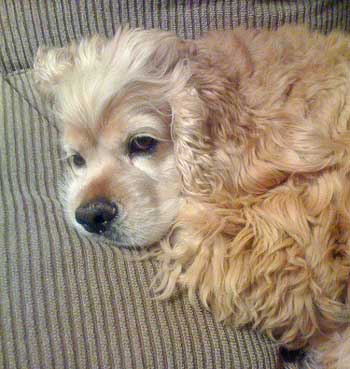 Leave me alone, I'm sleepy!
Leave me alone, I'm sleepy!Over time these unburned calories will inevitably show as fat on your pet, and he'll become increasingly overweight if it's not managed.
It's not easy for an older dog to lose weight, especially if he can't exercise as much as he used to, so it's better to take action as soon as you feel it necessary.
You could gradually reduce the amount of food an older dog eats to compensate for his increasingly sedate lifestyle. Alternatively, you could switch him over to a low-calorie food specially formulated for older dogs - they're usually labelled as 'light' or 'senior'.
The senior Cocker Spaniel would probably also benefit from additional Omega oils 3 and 6 in his diet to help strengthen and ease the movement of his creaky old bones.
Many reliable dog foods on the market cater to the senior Cocker Spaniel diet.
The Cocker Spaniel Diet: Wet Or Dry Dog Food?
Do you feed your Cocker wet or dry dog food? There's pro's and con's to both, so in the end it all boils down to your (or your dog's!) personal preference.
Dry Dog Food (Kibble)
- Kibble, which are small or bite-sized dry biscuits (like those in the photo), are a complete meal. It contains everything your dog needs, except water.
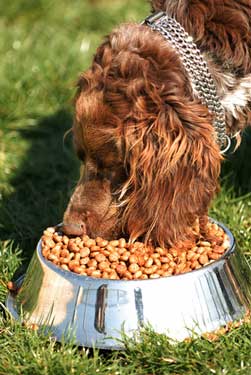 Yum Yum!
Yum Yum!- The biscuits are available in various flavours: lamb, salmon, rabbit or chicken, and the kibble will probably contain rice or oatmeal, essential oils, vitamins, and minerals.
- Dry food doesn't smell; it's easy to use and clean.
- An open bag of kibble won't go off in a hurry.
- Kibble is better for your Cocker Spaniel's teeth as the rough, crunchy texture can help remove plaque before it can build up and harden.
- A dry food diet may seem more expensive than other dog food, but it can be excellent value for money because it's a complete meal and there's no waste.
Puppies sometimes find it challenging to crunch kibble and refuse to eat it, preferring the softer, smellier, wet dog food.
If your puppy isn't keen on kibble, simply moisten it with a little warm water 5 or 10 minutes before dinner time. It will soften the kibble and make it easier for your pet to eat.
Gradually reduce the amount of water you add to the kibble until you can serve it dry.
Please Note: Always make sure your puppy has plenty of fresh drinking water because kibble contains only minimal moisture.
Tinned Dog Food (Wet)
Many owners prefer to feed their pets on wet dog food. I've never fed Max on tinned wet food for the following reasons:
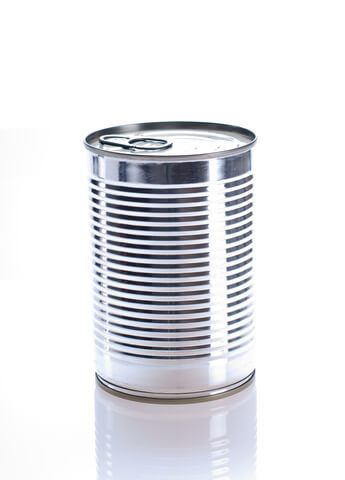 The cocker spaniel diet may consist of tinned meat and kibble
The cocker spaniel diet may consist of tinned meat and kibble- Tinned dog food is not always as nutritious as we're led to believe.
In addition, certain tinned dog foods are meant to be mixed with biscuits to add extra nutrition to bring the food up to a 'complete' meal.
Always check the ingredients label (see below) to ensure that it contains the correct level of nutrition your pet needs.
- Tinned dog food can be messy, can sometimes smell (although it may smell delicious to your dog!) and often needs to be refrigerated after opening.
- If your dog doesn't eat all of his meal, whatever's left in the bowl will quickly dry out and become inedible (not to mention getting the bowl clean again!), and it can also attract flies!
Personally, I prefer to feed Max kibble.
Not only because it provides him with the essential nutrients and vitamins he needs (particularly after being neutered), but because it's easy; kibble needs no preparation, it's clean, and it doesn't smell!
Most important of all, Max loves it!
Ingredients of a Healthy Cocker Spaniel Diet
Whatever dog food you choose to feed your pet, it's probably wise to check the manufacturer's ingredients label to understand what's in it and be sure that it closely matches the nutritional values recommended by your vet.
Generally, the more expensive the food, the better quality ingredients it will contain.
If the percentage of protein, carbohydrates, fats, etc., is not listed by the manufacturer, the order of listing on the label will usually indicate the main ingredients.
For example, the food will probably contain a higher percentage of the first listed ingredient, the second on the list the next highest, etc.
The label should also indicate whether or not vitamins and supplements have been added. Extra vitamins and fatty acids such as vitamin E and Omega 3 and 6 are good, especially for puppies and lactating bitches.
If you are in any doubt about the dog food ingredients listed on the manufacturer's food packaging, why not have a quick word with your vet?
Cocker Spaniel Diet & Home Made Dog Food
Cooking for your pet can be very enjoyable (and it's always appreciated!).
Still, the best bit is that you know exactly what goes into it by making your own homemade dog food - hopefully, nothing but good wholesome fresh food!
Whilst we're on the subject of homemade dog food, did you know that many poisons lurk in your kitchen in the form of everyday human foods?
If you plan on making your pet's food from scratch, why not look at the information in the previous link and bring yourself up to speed with what's safe and what isn't safe to feed your pet?
Meanwhile, you'll find a great selection of homemade dog food recipes here for you to try, and we'd love to hear from you if you have a favourite recipe of your own that you'd like to share with us!
How Much Should I Feed My Cocker Spaniel?
Because dogs and puppies are all different, they don't have the exact nutritional needs.
Their needs differ depending on their age, weight, and lifestyle, so it's essential to follow the advice of your vet or the feeding instructions on the dog food manufacturer's labels.
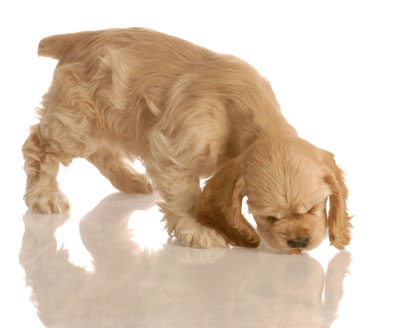 Oh, look what I found!
Oh, look what I found!I especially recommend you take care of portion sizes to ensure you don't overfeed your pet. I was so guilty of this!
Max was beginning to look a little chubby not so long ago, so I weighed his daily allowance (according to the manufacturer's recommendations) to ensure I wasn't overfeeding him, which I was!
I now use a plastic cup with a line marked on it and pour his kibble up to that line.
It saves me from weighing his food each day, and I'm very strict about sticking to the correct measure. I feed him twice a day, so he gets half a cup in the morning and the other half towards the end of the day.
I've stopped rewarding him with food treats every time he's good; I now reward him with praise and a cuddle 3 times out of 5 - the other 2, I reward him with a few pieces of his kibble (taken from his cup).
If you're feeding a puppy, it's necessary to follow a different routine because puppies need to eat little and often, and their diet will differ from an adult's.
If you're feeding an adult dog, I recommend you feed him twice each day - morning and late afternoon - simply divide his daily food allocation into two portions.
Important Note About The Cocker Spaniel Diet:
All dogs have different nutritional needs depending on their age, lifestyle, and health, so it's essential to speak to your vet for advice on the correct diet for your pet.
Dog Food Aggression
While we're on the subject of food, I'd like to mention a condition called dog food aggression. This is where your Cocker begins to guard his food quite aggressively and will growl or attack anyone near his food.
If this condition isn't addressed quickly, it can easily get out of hand and become very dangerous. I recommend you read this article on dog food aggression to understand the signs of food aggression and what you can do about it.
Cocker Spaniel Diet: Summary
Feeding our pets well, with good quality, nutritional food (human grade if you can afford it) will help boost your pet's immunity and, help fight off illness, disease, food allergies and help keep him fit healthy.
You'll also see an improved appearance (clear skin, shining coat, sparkling eyes, etc.), and you may see an improvement in his behaviour.
No matter how your Cocker Spaniel's diet is made up, make sure he has plenty of fresh vegetables and fruits; carrots, broccoli, spinach, apples and blueberries because they're good for him.
Don't give him citrus fruits as they contain citric acids and oils, which can cause sickness and diarrhoea problems. Even the smallest piece of orange, lemon or lime could give your dog a nasty tummy ache!
By spending a little more on your pet's food, you will be helping to make sure he has a healthier life, and having a healthier life, your dog won't need so many trips to the vet. Fewer trips to the vets mean more money in your pocket.
A healthy cocker spaniel diet equals a healthy cocker spaniel - result!
Photo Credits: Cocker Spaniel Diet
1. Ryan Johnson at https://www.flickr.com/photos/kmonojo/384544629/
2. Mike6219 at http://www.flickr.com/photos/mike6219/
3. Ozgur Ulker at http://www.dreamstime.com/royalty-free-stock-image-brown-cocker-spaniel-eating-food-image13299676
4. Tikmindaugas at http://www.dreamstime.com/stock-photos-tin-canned-white-background-image15992053
5. Willeecole at http://www.dreamstime.com/stock-image-puppy-chasing-piece-dog-food-image7324311


